I realise this might be off-topic, but is it really? We are placing so much focus on The Voice, dare I say, other than really important issues, such as the Family Law Reform bill that is going to impact far more Australians and the outcome is going to be disastrous for our families, our children who are missing their Dads and the men who will be so devastated that they take their own life!
Sue Price, Men’s Rights Agency
Sorry, but can we all please move on from the guilt trips for non-Aboriginal Australians?
The Australian 19 Aug 23
DOUGLAS MURRAY
A Bankstown City Cou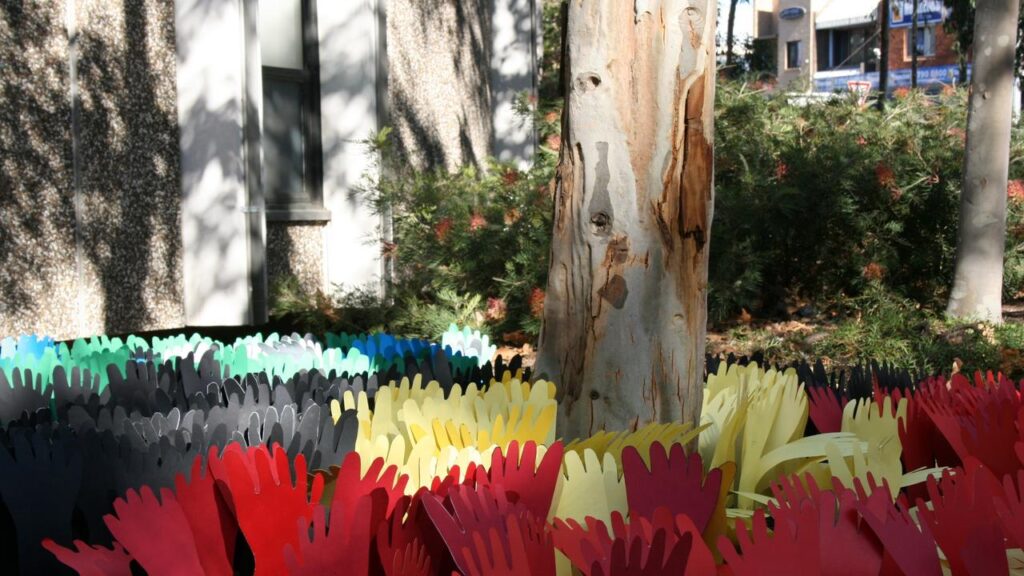 ncil display for Sorry Day.
ncil display for Sorry Day.
History is always being re-evaluated. Countries constantly evolve. But rarely has a country had a change as abrupt and comprehensive as Australia in one generation. America has suffered some of it. Canada a great deal of it. But among all the countries I know, Australia seems to have gone most all-in on a re-estimation of itself. And before I get to the results, let me point to the origin.
It is very simple, really. It is that thing which John Howard caused such controversy by touching on recently when he said “the luckiest thing that happened to this country was being colonised by the British”.
On balance, do you think that it was a good thing that the country you are in was founded or not?
In the case of Australia, do you think it was on balance a good thing that the English arrived? In the case of America, would you, on balance, rather that Christopher Columbus had not set sail? Or should he – having discovered America – have returned home and pretended that there was nothing worth seeing out there?
Until very recently the answer that most Australians, like Americans, would have given to such questions would have been, “Obviously, I’m glad that the country was discovered. And the Europeans were among the better people to discover the land.”
The Prime Minister is “running out of time” to boost the ‘Yes’ vote before the Voice to Parliament referendum, says…
Would the history of Australia have been better or worse if the Chinese had colonised it first? Or if the Persians had sent their prisoners to these shores? Would it have been better for America if Columbus had been a Mongol or a Hutu? We will never know because the experiment is impossible to run. But it is suggestive. And it allows us to add some context. Because when it comes to the case of Australia, as with America and Canada, it is context that is being most lost. And that context is everything.
Of course there is plenty of emphasis on the sufferings of Aboriginal Australians. Not all of which is inflicted by others. But I often marvel at how much non-Aboriginal Australians have been expected to put up with in recent years. Not least the endless guilt-tripping and the apologies without end. The Sea of Hands displays in which hundreds of thousands of Australian citizens sponsored and signed plastic hands in Aboriginal colours to sit on the lawn outside buildings such as Parliament House in Canberra. The creation of a National Sorry Day back in 1998 and the signing of “Sorry Books”. This all happened in the last century. Nevertheless, the apologies never stop coming.
It is now 15 years since Kevin Rudd as prime minister made his apology to the Indigenous peoples of Australia. Has any of the guilt been alleviated since then? Have the “sorrys” washed away any blame? It seems not. But then, how could they? After all, something that the Australian debate seems to have almost completely ignored is something I have tried to bring out a number of times. And it is this.
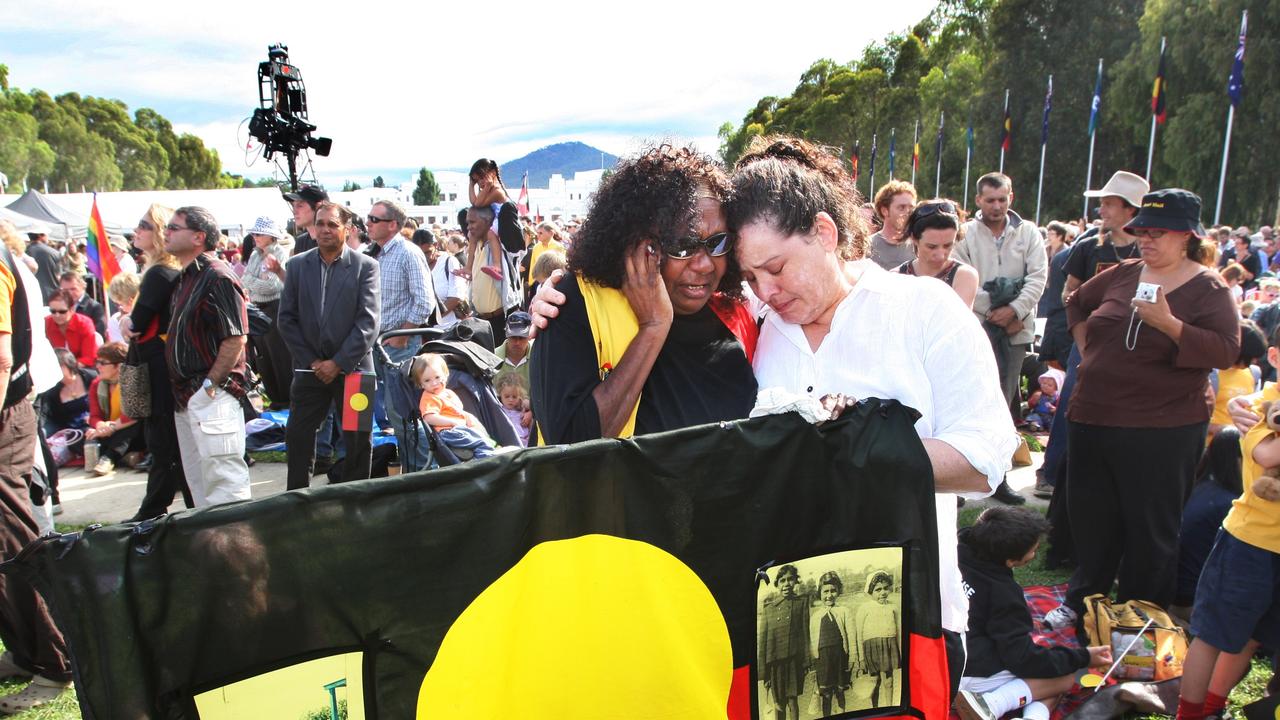
Australians gathered outside Parliament House in 2008, to hear then PMAustralians gathered outside Parliament House in 2008, to hear then PM Kevin Rudd say sorry to Indigenous Australians for the Stolen Generations. Picture: Phil Hillyard Kevin Rudd say sorry to Indigenous Australians for the Stolen Gcontent.api.news/…/097ca0ff899d35ed4c295ca67d6d9dfcenerations. Picture: Phil Hillyard
As a number of the most serious and profound ethicists of the last century have agreed, an apology can work only when it comes from someone who has done a wrong and is accepted by someone who has been wronged. If it comes from someone who has themselves done no wrong and goes to someone who has not actually been wronged, then the deal is a fraud. If such an apology is offered and accepted it is a fraud on both sides. Someone who has done no wrong is pretending to be speaking for the dead. And people who have suffered no direct wrong are pretending to be able to accept an apology on behalf of people they did not know.
This may seem a longwinded way to get to the core of more recent events. But it is important. Australia feels like it is stuck in an apology loop because it is. And the reason that it doesn’t seem to be getting the country anywhere is because it never could – however many cycles of this you want to go around for.
One thing that it does do is subdue the majority of Australians. As I have found when travelling the country, the typical Australian no longer seems to me to be that striding, sensible, happy-go-lucky figure of old. They seem – in my experience – to be guilt-ridden people, forever caveating their thoughts and self-conscious to an often excruciating degree.
Why? Because if you browbeat any group of people for long enough you will get that result. A cringing, creeping-through life person, who subdues their thoughts and distrusts their own speech and actions.
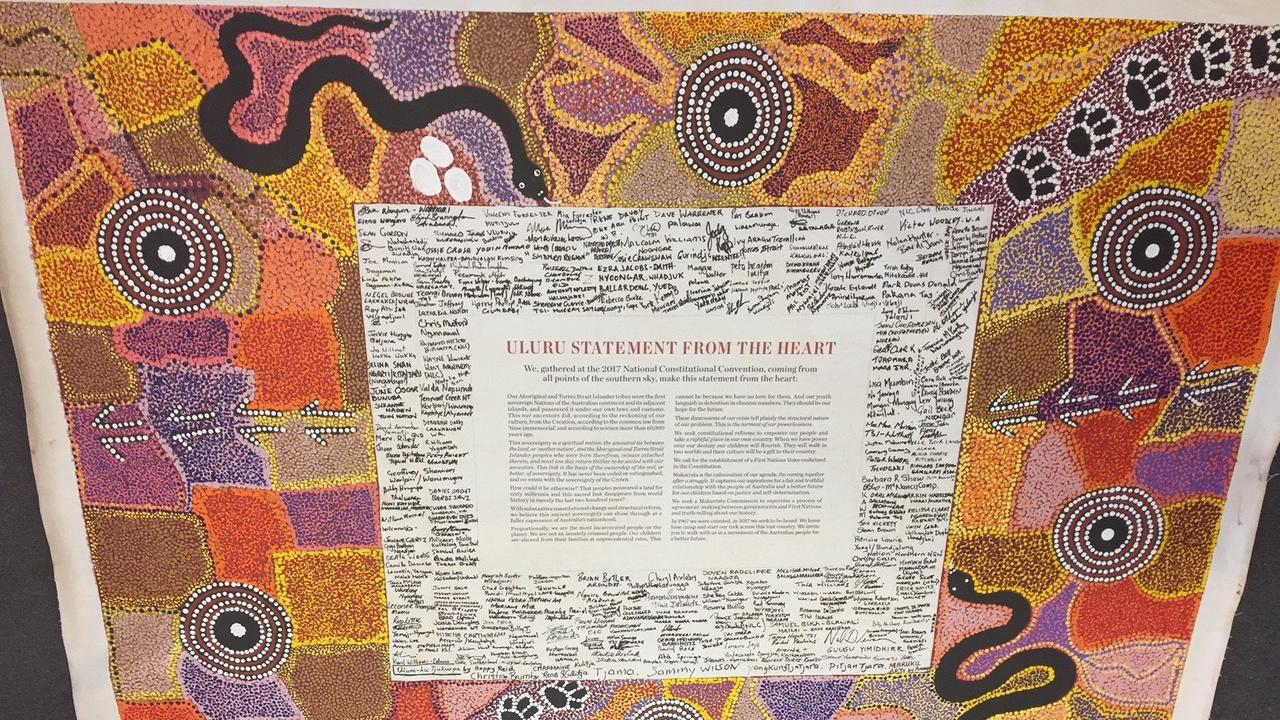
Which brings me back to that original question. Are you happy with the country as it is, or not?
That is the question underneath the debate on the Indigenous voice to parliament. A lot of what is being proposed sounds reasonable. But even before considering the content, just consider the tone in which these proposals are being put before the Australian people.
Thanks to an FOI we can now all read a collection of documents that informed the proposal for the Uluru Statement from the Heart. Allow me to quote:
“The invasion that started at Botany Bay is the origin of the fundamental grievance between the old and new Australians … this is the time of the Frontier Wars when massacres, disease and poison decimated First Nations even as they fought a guerrilla war of resistance. The Tasmanian Genocide and the Black War waged by the colonists reveals the truth about this evil time.
“The taking of our land without consent represents our fundamental grievance against the British Crown … By making agreements at the highest level, the negotiation process with the Australian government allows First Nations to express our sovereignty.”
That does not sound to me like the words of a group seeking dialogue or common ground. It is entirely based on the language of blame, victimhood and grievance. A language not of equality but of superiority. It refers to the British as “colonisers”, “invaders, murderers and rapists” who to this day are living “in a country that is not their own”.
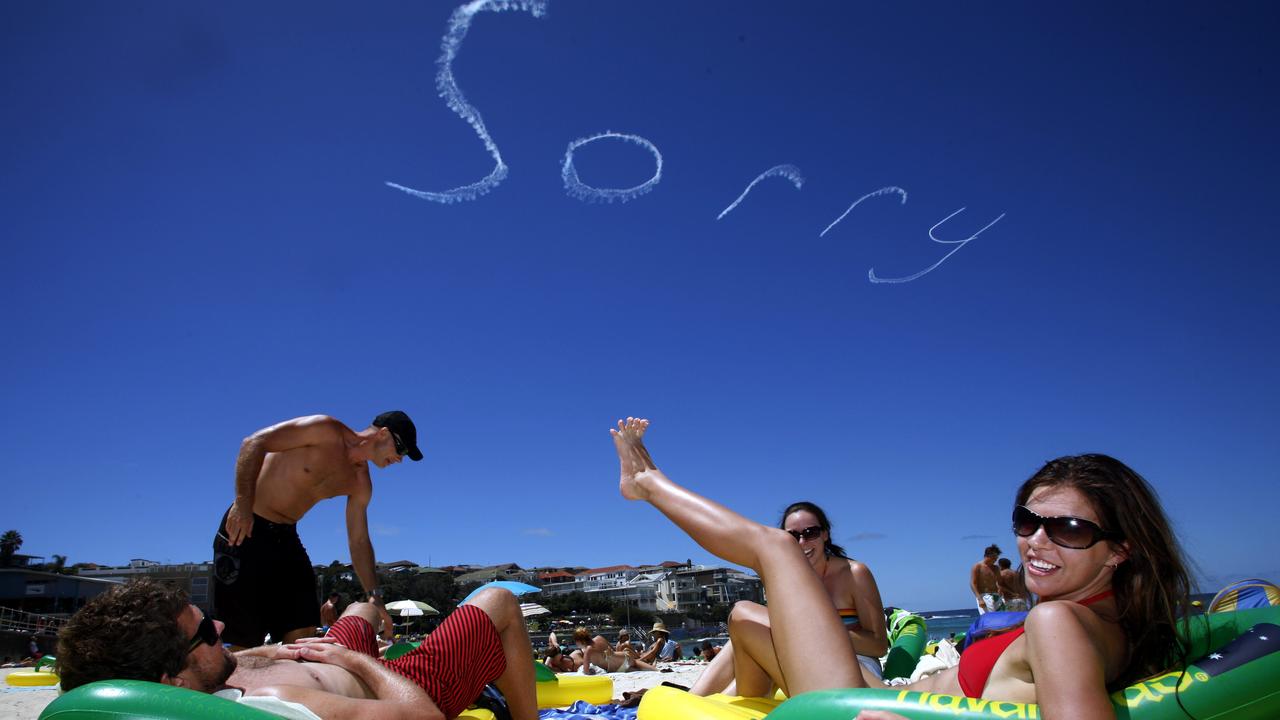
January 26, 2008 – a plane writes “SORRY” across the skies over Bondi on Australia Day Picture Warren Clarke
Any self-respecting person with some knowledge of history might make a few assertions of their own after reading that. They might ask whether life was so great for the settlers who arrived in those days. Plenty of them died of diseases that our species was ignorant about at the time. Besides, the Indigenous peoples were hardly a pacifist group, whatever the propagandistic history of those times now pretends.
Besides, who says whose land it is? If the Aboriginals were conquered or subjugated, then they can join the club of almost every group in human history. The whole of history is the story of peoples rolling into other peoples’ neighbourhoods, and either succeeding or failing to conquer them. It happens to be the story of Aboriginal culture as well, where Aboriginal groups subjugated, subdued and slaughtered each other. I know that it is now de rigueur to refer to the origins of the Aboriginal communities as Dreamtime. But there was nothing Dreamlike about Aboriginal societies. They were violent, poverty-stricken and woefully unadvanced even for their time.
Anyone who likes to romanticise that time today needs their head examined. You would have hated to have lived in those times, and nobody should kid themselves otherwise.
Australia’s Aborigines were not even yet pre-Medieval when the English arrived. They came face to face with the relative modernity of their time and modernity won. That may be an unpleasant fact to accept, but it is a fact. If the situations had been reversed then the outcomes would have been reversed. But they weren’t.
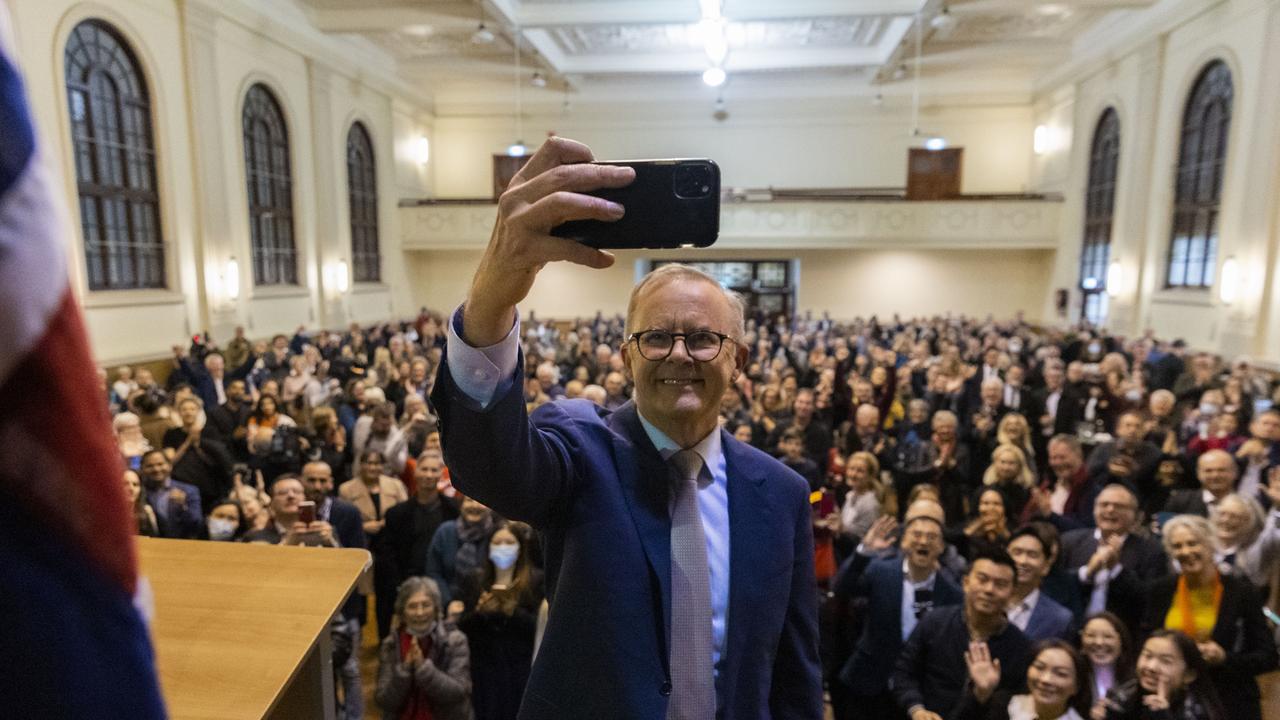
Anthony Albanese at Marrickville Town Hall.
Yet consider how completely the facts I have just stated have been made unsayable and effectively covered over. Prime Minister Anthony Albanese may have tried to keep this whole debate as unheated as possible. But even he has been happy to say – as he did at Marrickville Town Hall in October last year – that Australian history since 1788 had been a “brutal” history.
Perhaps he could soon tell us which group’s history has not been brutal in the past two-and-a- half centuries? Any contenders? Any at all? The Maori, perhaps? That wouldn’t be a good choice. In the 1800s the Maori were busy with their own intertribal “Musket wars” in which they traded with foreign markets – including the Chinese – for muskets with which they then attacked other Maori tribes. As Nigel Biggar has pointed out in his recent book weighing up the ethics of colonialism, “By the early 1830s the Maori were trading ‘the smoked heads of slain enemies’ for muskets, with some slaves being killed specifically to supply the heads for this grisly market.” Does anyone want to demand humility and apology from the Maori? If not, why not? Why must all historical apology and self-flagellation be in one direction alone?
It’s not a facile question. It gets to the root of what Australia is going to keep being put through if it continues down this path.
Bruce Pascoe – who Albanese so admires – is just one of those people who has helped feed the historical fantasy that is now rampant. What this always requires is a talking up of the horrors of the “colonisers” and at the same time a talking up of the achievements of the Indigenous population. That is how Pascoe got to his Dark Emu theory in which he claims that Aboriginal Australia was the first democracy in the world and existed for 80,000 years as a peaceful and blessed haven.
There are many people who would like to believe this – and not only many Aboriginal Australians. But once you concede nonsense, fantasy history like this you will find it very hard indeed to get your footing back.
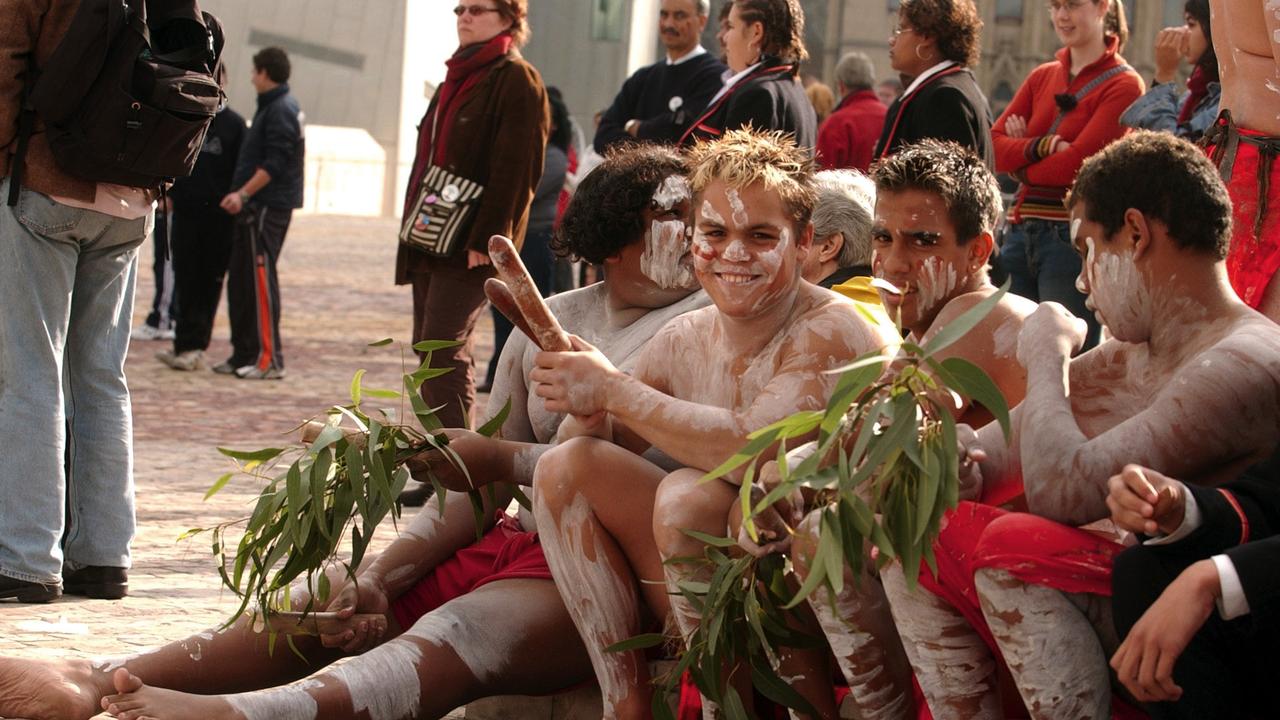
Young Aboriginal dancers adorned with body paint at Federation Square in Melbourne. Picture: AAP
The Prime Minister assures people that the upcoming vote is not about treaty. But you just watch. If the vote goes to the Yes camp, treaty will come next, with all its follow-on demands. After all, since Albanese has said no fewer than 34 times that his government is committed to the Uluru Statement “in full”, he ought to know that the mantra of the gathering that produced that statement was “Voice, Treaty, Truth”. So it looks like treaty will be on the table soon.
And why wouldn’t it be, when the point of view that Howard made recently seems so completely on the run?
The Yes campaign has already been incredibly successful in intimidating any and all opponents. It has been adept at claiming everything it doesn’t like (such as Nine’s July anti-voice ad) is “racist”. Of course. Because everything in its view is racist. Including the founding of Australia. And if the founding of a country is “racist” then everything in it is “racist”.
I see decent commentators trying to make their partial or full “don’t hurt me” statements. One recently did the compulsory knee-bend about the way in which, compared with the Aboriginal people, “we’ve all just stepped off the boat”. Well, just see how far that gets you. And wonder where else such kowtowing would be encouraged. Would you like to scour England and tell all the people who’ve stepped off the boat more recently than the Anglo-Saxons that they have some apologising to do? I’d like to see someone try.
Independent Senator Lidia Thorpe pushed for a treaty with Indigenous Australians during her National Press Club…
Would you like to try this exercise in any of the kingdoms ransacked by the Mongols, or the Russians? As my late friend Clive James used to say, with great wisdom, in the end “we are here because history happened”.
It could have gone any number of other ways. But it didn’t. A wise person – and a wise nation – accepts that and gets on with things.
After all, Australia’s situation is not unique. It is a situation that every nation in the world knows about to some generally greater degree. It is the story of humanity, in all its darkness and light.
Australia has the choice of conceding that it is wicked and that all failures of the Aboriginal peoples in the past and present are directly due to the “settlers”. Or it can concede that one of the least racist countries in the world should at some point give itself a break. The English did nothing wrong. Neither did any of you.
Douglas Murray is an English author and columnist. His latest book is The War on the West (HarperCollins Australia).
Sorry, but can we all please move on from the guilt trips for non-Aboriginal Australians? The Australian 19 Aug 23 DOUGLAS MURRAY
Share This Post
I realise this might be off-topic, but is it really? We are placing so much focus on The Voice, dare I say, other than really important issues, such as the Family Law Reform bill that is going to impact far more Australians and the outcome is going to be disastrous for our families, our children who are missing their Dads and the men who will be so devastated that they take their own life!
Sue Price, Men’s Rights Agency
Sorry, but can we all please move on from the guilt trips for non-Aboriginal Australians?
The Australian 19 Aug 23
DOUGLAS MURRAY
A Bankstown City Cou ncil display for Sorry Day.
ncil display for Sorry Day.
History is always being re-evaluated. Countries constantly evolve. But rarely has a country had a change as abrupt and comprehensive as Australia in one generation. America has suffered some of it. Canada a great deal of it. But among all the countries I know, Australia seems to have gone most all-in on a re-estimation of itself. And before I get to the results, let me point to the origin.
It is very simple, really. It is that thing which John Howard caused such controversy by touching on recently when he said “the luckiest thing that happened to this country was being colonised by the British”.
On balance, do you think that it was a good thing that the country you are in was founded or not?
In the case of Australia, do you think it was on balance a good thing that the English arrived? In the case of America, would you, on balance, rather that Christopher Columbus had not set sail? Or should he – having discovered America – have returned home and pretended that there was nothing worth seeing out there?
Until very recently the answer that most Australians, like Americans, would have given to such questions would have been, “Obviously, I’m glad that the country was discovered. And the Europeans were among the better people to discover the land.”
The Prime Minister is “running out of time” to boost the ‘Yes’ vote before the Voice to Parliament referendum, says…
Would the history of Australia have been better or worse if the Chinese had colonised it first? Or if the Persians had sent their prisoners to these shores? Would it have been better for America if Columbus had been a Mongol or a Hutu? We will never know because the experiment is impossible to run. But it is suggestive. And it allows us to add some context. Because when it comes to the case of Australia, as with America and Canada, it is context that is being most lost. And that context is everything.
Of course there is plenty of emphasis on the sufferings of Aboriginal Australians. Not all of which is inflicted by others. But I often marvel at how much non-Aboriginal Australians have been expected to put up with in recent years. Not least the endless guilt-tripping and the apologies without end. The Sea of Hands displays in which hundreds of thousands of Australian citizens sponsored and signed plastic hands in Aboriginal colours to sit on the lawn outside buildings such as Parliament House in Canberra. The creation of a National Sorry Day back in 1998 and the signing of “Sorry Books”. This all happened in the last century. Nevertheless, the apologies never stop coming.
It is now 15 years since Kevin Rudd as prime minister made his apology to the Indigenous peoples of Australia. Has any of the guilt been alleviated since then? Have the “sorrys” washed away any blame? It seems not. But then, how could they? After all, something that the Australian debate seems to have almost completely ignored is something I have tried to bring out a number of times. And it is this.
Australians gathered outside Parliament House in 2008, to hear then PMAustralians gathered outside Parliament House in 2008, to hear then PM Kevin Rudd say sorry to Indigenous Australians for the Stolen Generations. Picture: Phil Hillyard Kevin Rudd say sorry to Indigenous Australians for the Stolen Gcontent.api.news/…/097ca0ff899d35ed4c295ca67d6d9dfcenerations. Picture: Phil Hillyard
As a number of the most serious and profound ethicists of the last century have agreed, an apology can work only when it comes from someone who has done a wrong and is accepted by someone who has been wronged. If it comes from someone who has themselves done no wrong and goes to someone who has not actually been wronged, then the deal is a fraud. If such an apology is offered and accepted it is a fraud on both sides. Someone who has done no wrong is pretending to be speaking for the dead. And people who have suffered no direct wrong are pretending to be able to accept an apology on behalf of people they did not know.
This may seem a longwinded way to get to the core of more recent events. But it is important. Australia feels like it is stuck in an apology loop because it is. And the reason that it doesn’t seem to be getting the country anywhere is because it never could – however many cycles of this you want to go around for.
One thing that it does do is subdue the majority of Australians. As I have found when travelling the country, the typical Australian no longer seems to me to be that striding, sensible, happy-go-lucky figure of old. They seem – in my experience – to be guilt-ridden people, forever caveating their thoughts and self-conscious to an often excruciating degree.
Why? Because if you browbeat any group of people for long enough you will get that result. A cringing, creeping-through life person, who subdues their thoughts and distrusts their own speech and actions.
Which brings me back to that original question. Are you happy with the country as it is, or not?
That is the question underneath the debate on the Indigenous voice to parliament. A lot of what is being proposed sounds reasonable. But even before considering the content, just consider the tone in which these proposals are being put before the Australian people.
Thanks to an FOI we can now all read a collection of documents that informed the proposal for the Uluru Statement from the Heart. Allow me to quote:
“The invasion that started at Botany Bay is the origin of the fundamental grievance between the old and new Australians … this is the time of the Frontier Wars when massacres, disease and poison decimated First Nations even as they fought a guerrilla war of resistance. The Tasmanian Genocide and the Black War waged by the colonists reveals the truth about this evil time.
“The taking of our land without consent represents our fundamental grievance against the British Crown … By making agreements at the highest level, the negotiation process with the Australian government allows First Nations to express our sovereignty.”
That does not sound to me like the words of a group seeking dialogue or common ground. It is entirely based on the language of blame, victimhood and grievance. A language not of equality but of superiority. It refers to the British as “colonisers”, “invaders, murderers and rapists” who to this day are living “in a country that is not their own”.
January 26, 2008 – a plane writes “SORRY” across the skies over Bondi on Australia Day Picture Warren Clarke
Any self-respecting person with some knowledge of history might make a few assertions of their own after reading that. They might ask whether life was so great for the settlers who arrived in those days. Plenty of them died of diseases that our species was ignorant about at the time. Besides, the Indigenous peoples were hardly a pacifist group, whatever the propagandistic history of those times now pretends.
Besides, who says whose land it is? If the Aboriginals were conquered or subjugated, then they can join the club of almost every group in human history. The whole of history is the story of peoples rolling into other peoples’ neighbourhoods, and either succeeding or failing to conquer them. It happens to be the story of Aboriginal culture as well, where Aboriginal groups subjugated, subdued and slaughtered each other. I know that it is now de rigueur to refer to the origins of the Aboriginal communities as Dreamtime. But there was nothing Dreamlike about Aboriginal societies. They were violent, poverty-stricken and woefully unadvanced even for their time.
Anyone who likes to romanticise that time today needs their head examined. You would have hated to have lived in those times, and nobody should kid themselves otherwise.
Australia’s Aborigines were not even yet pre-Medieval when the English arrived. They came face to face with the relative modernity of their time and modernity won. That may be an unpleasant fact to accept, but it is a fact. If the situations had been reversed then the outcomes would have been reversed. But they weren’t.
Anthony Albanese at Marrickville Town Hall.
Yet consider how completely the facts I have just stated have been made unsayable and effectively covered over. Prime Minister Anthony Albanese may have tried to keep this whole debate as unheated as possible. But even he has been happy to say – as he did at Marrickville Town Hall in October last year – that Australian history since 1788 had been a “brutal” history.
Perhaps he could soon tell us which group’s history has not been brutal in the past two-and-a- half centuries? Any contenders? Any at all? The Maori, perhaps? That wouldn’t be a good choice. In the 1800s the Maori were busy with their own intertribal “Musket wars” in which they traded with foreign markets – including the Chinese – for muskets with which they then attacked other Maori tribes. As Nigel Biggar has pointed out in his recent book weighing up the ethics of colonialism, “By the early 1830s the Maori were trading ‘the smoked heads of slain enemies’ for muskets, with some slaves being killed specifically to supply the heads for this grisly market.” Does anyone want to demand humility and apology from the Maori? If not, why not? Why must all historical apology and self-flagellation be in one direction alone?
It’s not a facile question. It gets to the root of what Australia is going to keep being put through if it continues down this path.
Bruce Pascoe – who Albanese so admires – is just one of those people who has helped feed the historical fantasy that is now rampant. What this always requires is a talking up of the horrors of the “colonisers” and at the same time a talking up of the achievements of the Indigenous population. That is how Pascoe got to his Dark Emu theory in which he claims that Aboriginal Australia was the first democracy in the world and existed for 80,000 years as a peaceful and blessed haven.
There are many people who would like to believe this – and not only many Aboriginal Australians. But once you concede nonsense, fantasy history like this you will find it very hard indeed to get your footing back.
Young Aboriginal dancers adorned with body paint at Federation Square in Melbourne. Picture: AAP
The Prime Minister assures people that the upcoming vote is not about treaty. But you just watch. If the vote goes to the Yes camp, treaty will come next, with all its follow-on demands. After all, since Albanese has said no fewer than 34 times that his government is committed to the Uluru Statement “in full”, he ought to know that the mantra of the gathering that produced that statement was “Voice, Treaty, Truth”. So it looks like treaty will be on the table soon.
And why wouldn’t it be, when the point of view that Howard made recently seems so completely on the run?
The Yes campaign has already been incredibly successful in intimidating any and all opponents. It has been adept at claiming everything it doesn’t like (such as Nine’s July anti-voice ad) is “racist”. Of course. Because everything in its view is racist. Including the founding of Australia. And if the founding of a country is “racist” then everything in it is “racist”.
I see decent commentators trying to make their partial or full “don’t hurt me” statements. One recently did the compulsory knee-bend about the way in which, compared with the Aboriginal people, “we’ve all just stepped off the boat”. Well, just see how far that gets you. And wonder where else such kowtowing would be encouraged. Would you like to scour England and tell all the people who’ve stepped off the boat more recently than the Anglo-Saxons that they have some apologising to do? I’d like to see someone try.
Independent Senator Lidia Thorpe pushed for a treaty with Indigenous Australians during her National Press Club…
Would you like to try this exercise in any of the kingdoms ransacked by the Mongols, or the Russians? As my late friend Clive James used to say, with great wisdom, in the end “we are here because history happened”.
It could have gone any number of other ways. But it didn’t. A wise person – and a wise nation – accepts that and gets on with things.
After all, Australia’s situation is not unique. It is a situation that every nation in the world knows about to some generally greater degree. It is the story of humanity, in all its darkness and light.
Australia has the choice of conceding that it is wicked and that all failures of the Aboriginal peoples in the past and present are directly due to the “settlers”. Or it can concede that one of the least racist countries in the world should at some point give itself a break. The English did nothing wrong. Neither did any of you.
Douglas Murray is an English author and columnist. His latest book is The War on the West (HarperCollins Australia).
More To Explore
Just who is Labor trying to protect?
Menu Janet Albrechtsen Just who is Labor trying to protect? Royal commission avoidance job is sounding like a self-preservation society Listen to this article
Read More
Falsely accused police – Bettina Arndt
– Plus how domestic violence is destroying our police force https://open.substack.com/pub/bettinaarndt/p/falsely-accused-police?r=4mltur&utm_medium=ios Bettina Arndt Dec 03, 2025 Some months ago, Australia’s most senior judge, Chief
Read More
Join Men's Rights Agency
Australia's national, non-profit organisation providing a better outcome for men and their families.